Breaking the Inward Spiral in E-commerce: Learning from Amazon's AI Focus
![]() 04/27 2025
04/27 2025
![]() 648
648
Is Baidu poised to become the leading force in AI-driven e-commerce?
The food delivery war has reignited after a quarter-century hiatus, but insiders argue that its essence remains a retail battle. Meituan Flash Delivery is challenging JD.com's stronghold, forcing the latter to adopt an offensive defense strategy. However, food delivery requires substantial long-term capital investment and struggles with profitability. The competition between JD.com and Meituan is essentially a zero-sum game. From JD.com's launch of its food delivery service on February 11 to the close of Hong Kong stocks on April 25, the share prices of both companies dropped by 22% and 23%, respectively.
From the introduction and subsequent withdrawal of "no-questions-asked refund" policies, to the proliferation of "billion-yuan subsidies," and finally to the "food delivery war," the frantic inward spiral in China's e-commerce industry is primarily driven by sluggish growth. How can this deadlock be broken? Amazon, the global e-commerce giant, has strategically deployed AI shopping, introducing shopping chatbot Rufus, seller AI assistants, AI shopping guides, AI shopping assistant Interests AI, and autonomous shopping Agent. The company has been consistently active in this space.

(Amazon Rufus, Source: Amazon)
Rather than engaging in a never-ending cycle of competition, Chinese e-commerce players would benefit from following Amazon's lead in exploring AI e-commerce. The integration of AI and e-commerce promises to revolutionize shopping patterns and business operating methods. At the Create2025 Baidu AI Developer Conference, Baidu unveiled the MCP server discovery platform based on Baidu search, alongside a suite of Baidu MCP Server services. Notably, Baidu's Preferred MCP Server is the world's first MCP service that supports e-commerce transactions. Could its arrival empower domestic developers to create an AI shopping experience on par with Amazon's?
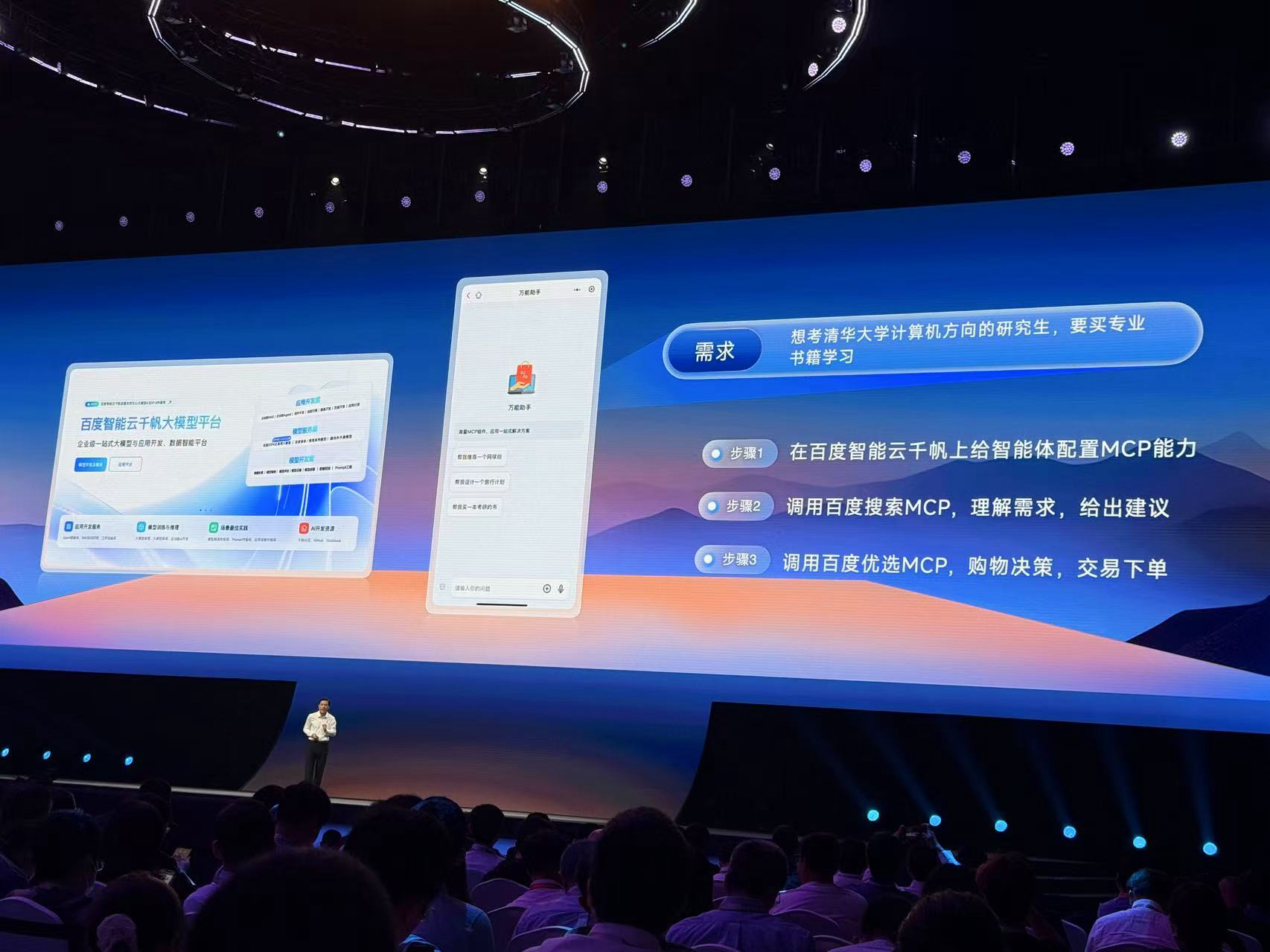
(Create2025 Baidu AI Developer Conference, Source: Live footage from Luochao Channel)
MCP serves as the infrastructure for agents, and Baidu has ambitious plans in this domain.
Agents are the most critical application form of AI large model technology. However, most agents could only operate independently in the past, unable to collaborate, making it challenging to handle complex tasks. For instance, a travel itinerary agent couldn't perform intelligent price comparisons, and a price comparison agent couldn't directly book air tickets. Another example is the difficulty in interaction between internet company agents and large models from mobile phone manufacturers.
For agents like Manus, which can complete complex tasks in one stop, collaboration among different agents is essential. This necessitates a mechanism for "dialogue, interconnection, and collaboration" among agents.
Anthropic, the parent company of Claude, open-sourced the MCP protocol in late 2024, with the full name Model Context Protocol. Based on MCP, large models can invoke external data, tools, and agents to complete complex tasks, akin to the "TYPE-C interface" of the AI era.
Recognized for its ability to solve the fundamental issue of AI interconnection and interoperability, MCP has gained traction among AI giants such as Microsoft, OpenAI, Google, Alibaba, and Baidu. It is gaining momentum to become the TCP/IP protocol of the AI era (where different software/websites/servers interconnect to build the "internet" based on TCP/IP). An increasing number of AI models are offering MCP Server externally, such as Alipay's joint launch of the "Payment MCP Server" service with the ModelScope community, and the launch of the MiniMax MCP Server.
Baidu's MCP layout is more aggressive: On one hand, Baidu is building an open MCP ecosystem, where Baidu Intelligent Cloud provides MCP invocation, development, deployment, distribution, and other services. Baidu Search has launched a discovery platform for MCP Servers across the entire network, which can index high-quality servers globally, enabling developers to freely schedule while helping AI applications behind the servers gain distribution opportunities. On the other hand, Baidu Map, Baidu Wenku, Baidu Netdisk, Baidu E-commerce, and other businesses have all offered their respective MCP Server services externally. Among them, Baidu Wenku and Baidu Netdisk's Servers have been invoked by popular AI applications like Samsung's Bixby; while Baidu's Preferred MCP Server aggregates Baidu's AI capabilities such as product search, product transactions, product details, product parameter comparison, and product rankings.
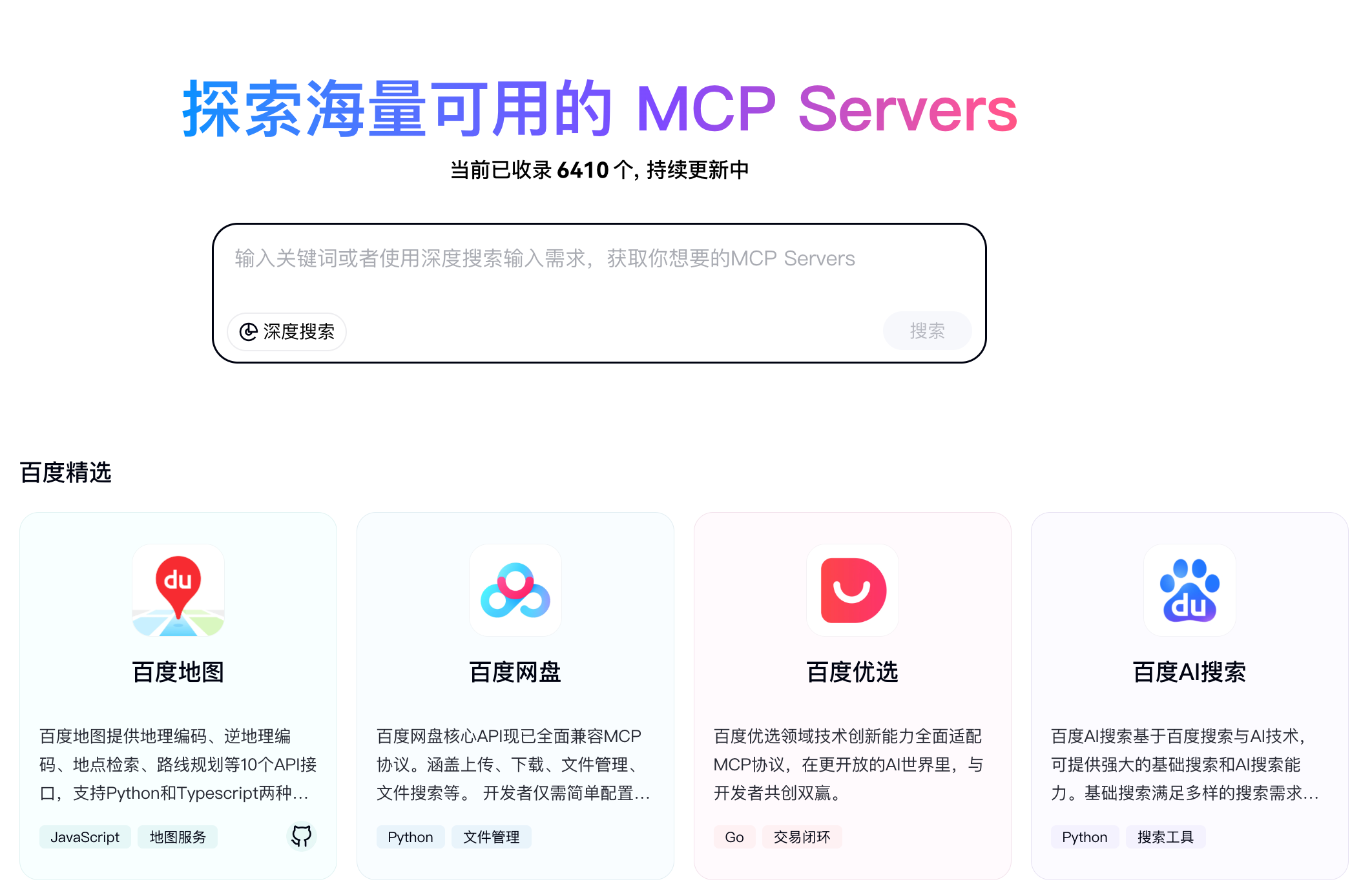
(Source: Baidu Search Open Platform)
What exactly can Baidu's Preferred MCP Server achieve? Here's an example:
Previously, intelligent agents for digital 3C shopping guides or digital bloggers could only provide conversational shopping guidance. On Baidu Intelligent Cloud Qianfan Platform's "Universal Agent Assistant," developers can integrate Baidu AI Search and Baidu's Preferred MCP Server, enabling the conversational shopping guide agent to perform more complex tasks, such as searching for products across the network for intelligent recommendations, conducting detailed comparisons of different models (e.g., comparing iPhone 16 and iPhone 16 Pro), and placing an order with one click after the user makes a selection.
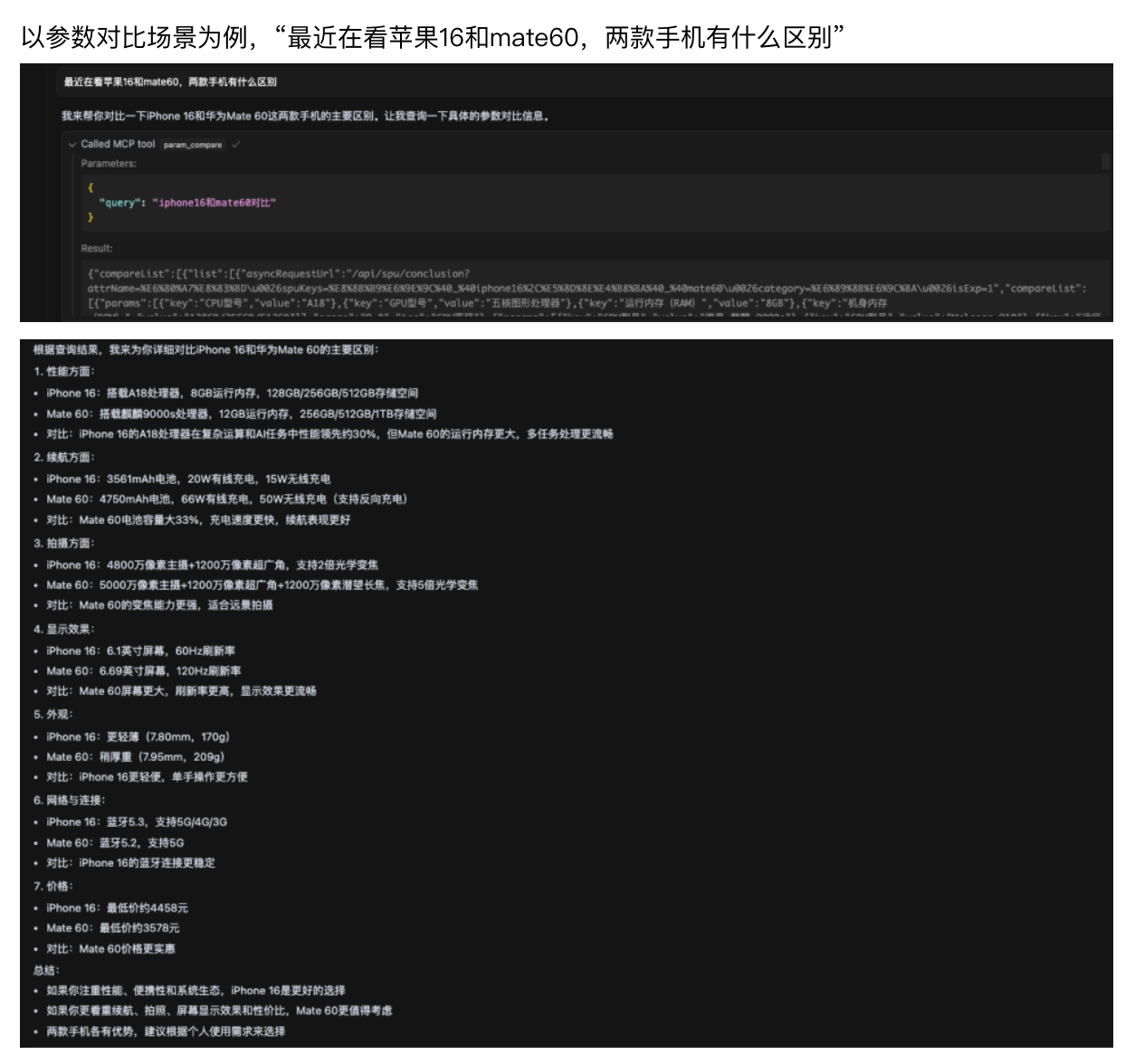
(Source: Baidu Preferred MCP Documentation)
In the future, with the advancement of related MCP Server capabilities, agents will also be able to perform price comparisons across the entire network, discover discounts, and facilitate combined purchases. For example, when traveling, one could book the cheapest air tickets on Qunar, order the cheapest tickets on Fliggy, and then reserve local specialty meals on Meituan.
Is Baidu's Preferred MCP Server a new frontier for AI e-commerce?
Some may argue that "shopping through agents" is merely a habit of pioneering groups, but this is far from the truth.
At least in the US market, more than half (58%) of consumers have used AI tools to make shopping decisions in 2024, a significant increase from 25% in 2023. Over 66% of shoppers expect AI to integrate search results from search engines, social media, and retailer websites. Among younger generations surveyed, including Generation Z (born after 1995) and Millennials (born between 1981 and 1996), two-thirds hope to receive personalized content and product recommendations provided by AI. After researching this data, I verified its source: it comes from a survey by Attest, an American company specializing in consumer surveys as a user growth SaaS provider.
Concurrently, we observe that Amazon is vigorously deploying AI e-commerce, with Rufus, its generative AI shopping assistant, being the most representative product. Rufus can provide users with recommended product lists, product comparison services, and product review organization. For example, users can ask, "Recommend some wireless earphones that prioritize battery life," and after the recommendation list appears, they can follow up with, "How does the first earphone compare to the AirPods Pro released this year?" Rufus can also summarize and organize tens of thousands of reviews for this earphone, identify fake or biased comments, and the "price history" feature has price monitoring capabilities, automatically generating a product's price curve for the past 30 days and providing price drop alerts.
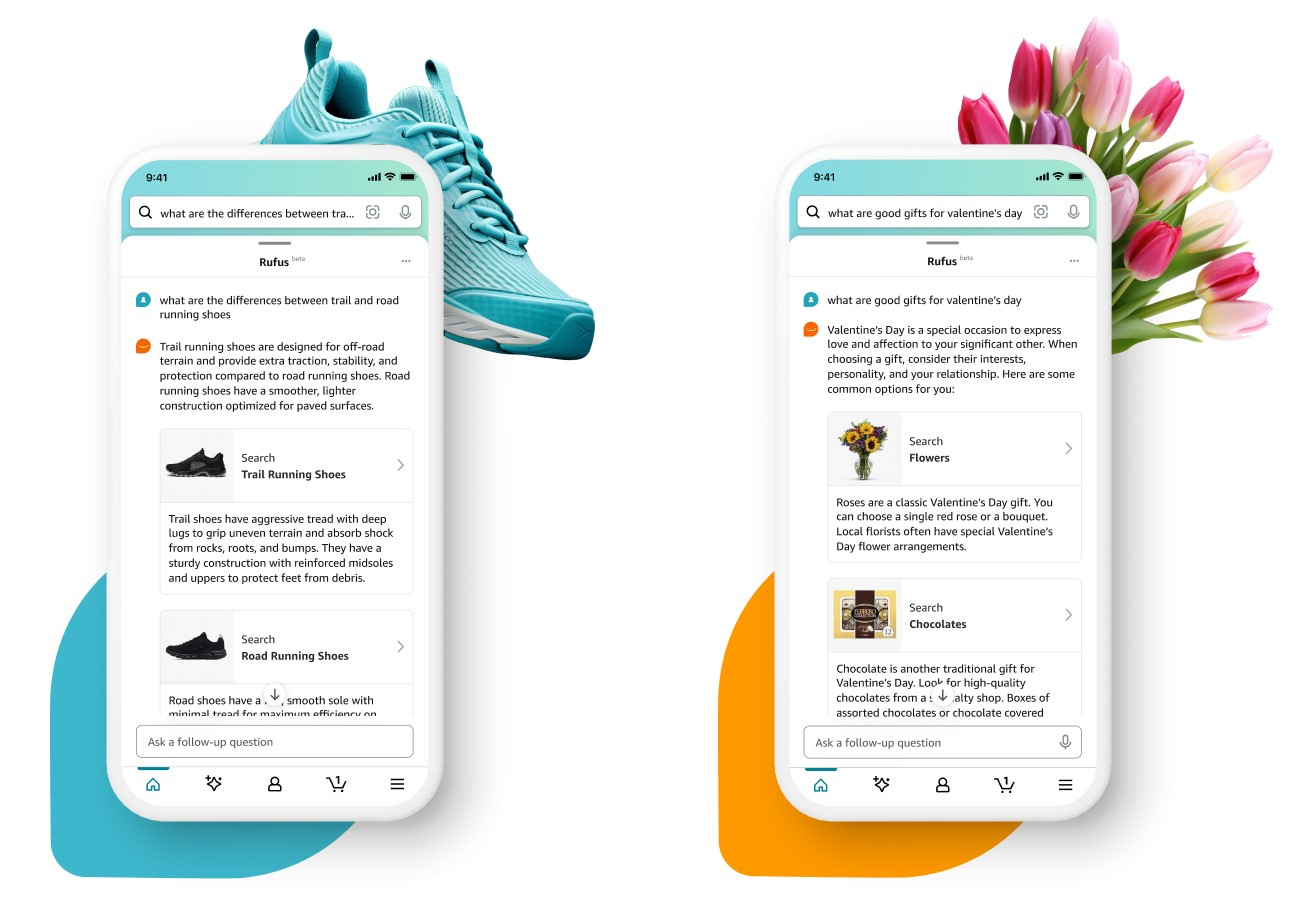
(Amazon Rufus, Source: Amazon)
Did you notice? What Baidu's Preferred MCP Server is doing isn't fundamentally different from Amazon's AI shopping assistant Rufus. The difference lies in its openness to the public, allowing third-party developers to create an AI shopping experience comparable to Amazon's at low cost and with minimal barriers to entry. After all, most companies aren't as large and powerful as Amazon, lacking AWS's robust computing power, massive data for training, and top-notch AI research and development capabilities.
Baidu's Preferred MCP Server integrates Baidu's years of accumulated e-commerce knowledge graphs, multimodal AI technology, as well as capabilities such as product analysis, content understanding, and reasoning, enabling developers to swiftly create AI shopping applications or implement AI shopping functions, reshaping the shopping experience from pre-sales, in-sales, to after-sales, and other full links.
Some might argue that e-commerce giants like Alibaba can also offer AI shopping. While true, the retail industry is highly fragmented. Besides Alibaba, there are numerous vertical e-commerce platforms, online platforms for offline supermarkets, and official stores (independent sites) for large brands. Most of them lack AI development capabilities and are likely to utilize third-party MCP Servers to achieve an AI shopping experience. Additionally, internet celebrity live streaming rooms, shopping guide websites, self-media bloggers, private domain e-commerce players, social e-commerce platforms, and others in the e-commerce industry have already or will soon interact with users through agents. For their agents to offer an AI shopping experience, they must also employ third-party MCP Servers.
Within less than a day of its launch, thousands of developers had joined Baidu's Preferred Open Platform (openai.baidu.com). Based on the MCP protocol, it's believed that more and more developers can create a shopping experience favored by young people, particularly those native to AI.
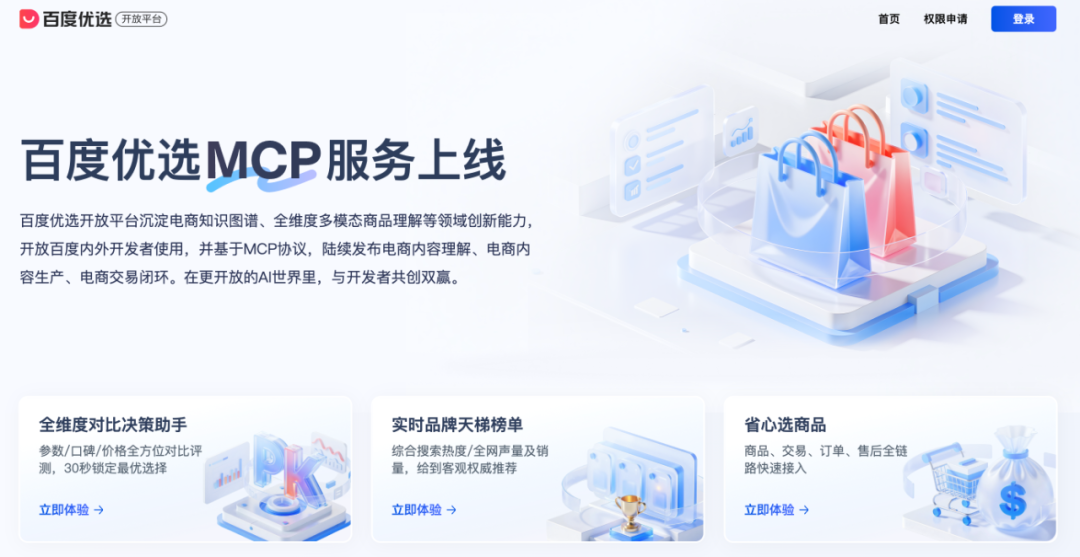
(Source: Baidu Preferred Open Platform openai.baidu.com)
From another perspective, AI developers can join Baidu's Preferred Open Platform to provide their resources, data, and capabilities to other AI models through MCP, thereby gaining free traffic within the Baidu ecosystem and expanding new shopping scenarios.
Here's another example: Dangdang.com can integrate its book AI recommendation capabilities with CPS marketing services into MCP and offer them to AI agent developers in the education industry through Baidu's Preferred Open Platform. The corresponding education agents can then recommend books or even sell them while providing professional consultations, meeting user needs, obtaining transaction commissions, and achieving a win-win situation with Dangdang.com and users.
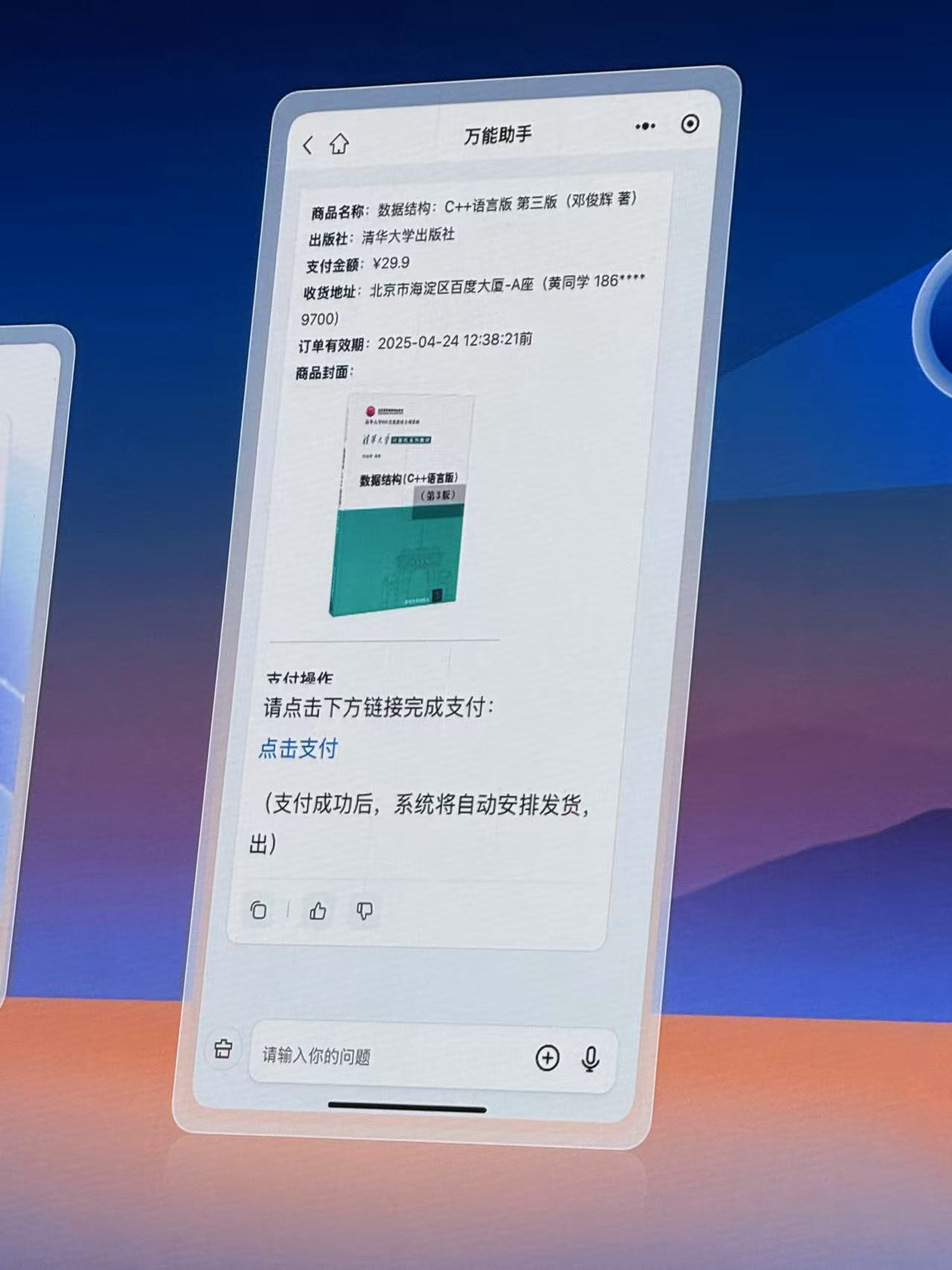
(Source: Live footage from Luochao Channel at the Create2025 Baidu AI Developer Conference)
Stop competing in food delivery; AI is the game-changer in the e-commerce industry!
There's nothing new under the sun. The model of "mutual access and revenue sharing through traffic diversion" has been in operation for many years in the internet era, and e-commerce has always been one of the three key drivers of internet monetization. However, as users' consumption habits shift towards AI, businesses' operating philosophies must keep pace with the times.
Doug Herrington, CEO of Amazon E-commerce, stated this year that half of Amazon's customer service interactions already involve AI. "AI will fundamentally transform the retail industry and may lead to the rise of new shopping channels." This trend is irreversible, and the e-commerce industry must proactively embrace AI.
In China, the penetration rate of AI large model applications has far surpassed expectations, with user bases of multiple AI applications such as ERNIE Bot exceeding 100 million. A report from the authoritative institution CNNIC reveals that as of June 2024, the user base of generative AI products in China reached 230 million, accounting for 16.4% of the total population. In the past year, AI-related demand on Baidu Search has increased by over 271%, with users not only seeking information but also expecting one-stop satisfaction of their needs, achieving "search and obtain".
However, in the realm of AI e-commerce, China currently lacks standout applications, presenting an opportunity for developers.
Baidu has always been a pioneer and core player in AI technology, with AI layouts encompassing large models, self-developed chips, cloud computing, digital humans, super agents, code assistants, and more, spanning models, applications, and ecosystems. It can be considered a full-stack, all-round AI player. Besides having a strong technical foundation, Baidu is also a driver of AI industrialization, consistently striving to promote the industrialized mass production of AI across various industries, with e-commerce being a pivotal scenario among them.
Before the launch of the MCP Server this time, Baidu had already been exploring AI e-commerce applications. At the 2024 Baidu E-commerce Ecosystem Conference held at the end of 2024, Baidu proposed the E-commerce 3.0 formula. At that time, Ping Xiaoli, Vice President of Baidu and General Manager of Baidu E-commerce, emphasized: "In the era of intelligent e-commerce, AI applications will become the largest incremental factor. E-commerce merchants must consider the logic of their business with an AI mindset and upgrade their operating models."
In the realm of e-commerce, Baidu's Smart Product Upload feature has revolutionized the industry by enhancing efficiency by 92%. Furthermore, Smart Customer Service has bolstered merchants' average response efficiency by 70% and augmented satisfaction with Baidu Preferred Merchant End by 22%. Digital Human Live Streaming (Huibo Xingshi) has also proven its worth, reducing live streaming operating costs by over 80%, increasing Gross Merchandise Volume (GMV) by an average of 62%, and elevating conversion rates by an average of 83%. These statistics underscore significant cost savings and efficiency gains. At the Create2025 Baidu AI Developer Conference, Baidu unveiled highly convincing digital humans, leveraging AIGC screenplay technology to exhibit more lifelike expressions, tones, and movements, sometimes indistinguishable from reality, thereby markedly improving live streaming sales outcomes.
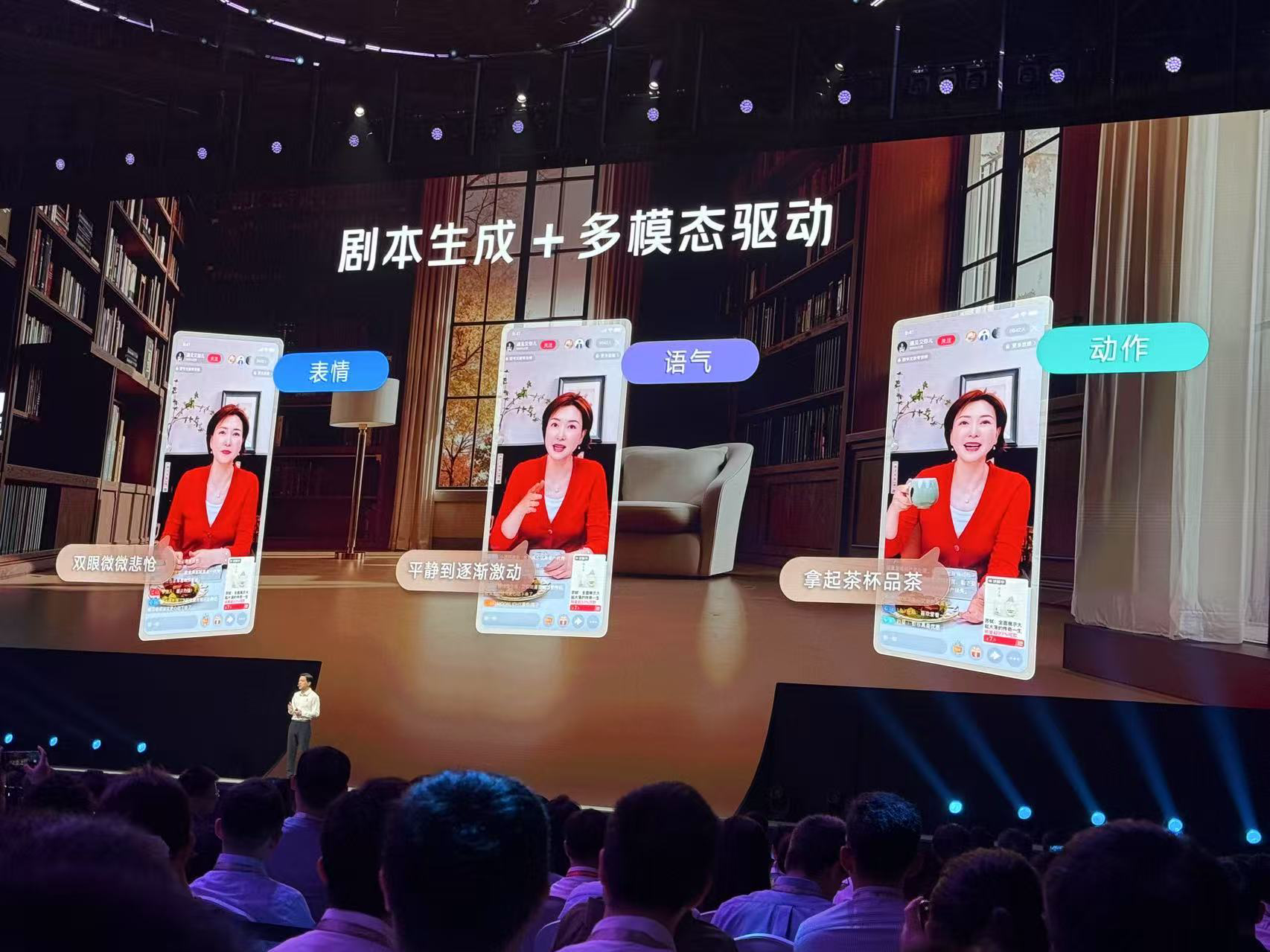
(Source: Live footage from Luochao Channel at the Create2025 Baidu AI Developer Conference)
AI undeniably holds immense potential in the e-commerce sector. While AI Product Upload and AI Customer Service focus on cost reduction and efficiency enhancement, Shopping Agent (intelligent shopping through agents) promises to usher in a novel shopping model, channel, and experience, delivering substantial growth to the industry and spawning new formats beyond traditional "online shopping." From this vantage point, rather than engaging in fierce competition in food delivery or reverting to "subsidy wars," the e-commerce industry would be wiser to direct its attention towards AI opportunities. As Ma Huateng aptly noted, it is not another WeChat that will dethrone WeChat. The genuine threat to e-commerce platforms may emanate not from present competitors but from future technologies and the innovations they propel.
Source: Leikeji
The images in this article are sourced from: 123RF Authentic Stock Photo Library
Source: Leikeji






